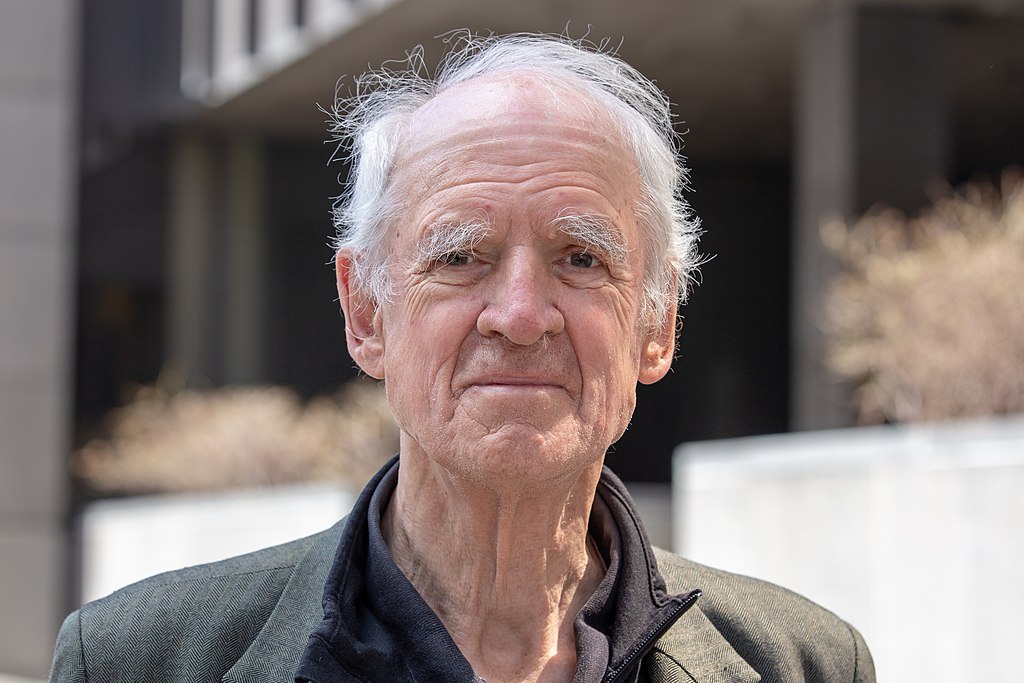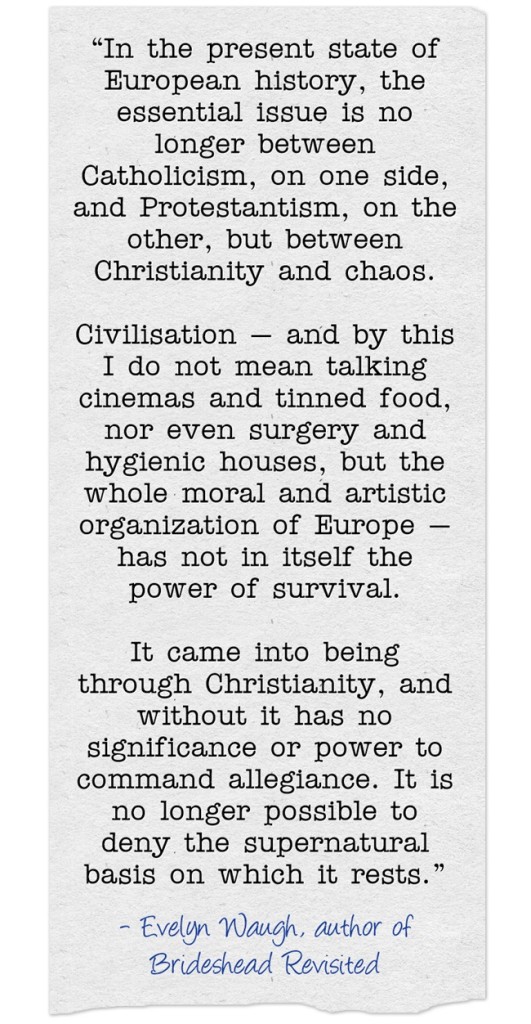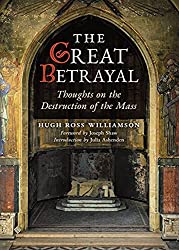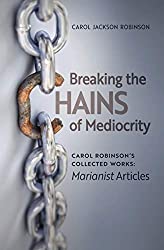2023 Update: What we have here is another in a series of musings on Charles Taylor, begun many years ago, when this site started in 2009. For navigation purposes, we list and link the five parts here:
- A Secular Age – Charles Taylor’s Acceptable Loss?
- Catholic Tradition, Charles Taylor and Evelyn Waugh
- Catholic Tradition, Charles Taylor and Supernatural Mystery
- Catholic Tradition, Charles Taylor and Charles Krauthammer
- Catholic Tradition, Charles Taylor and Phillip Larkin
And now back to 2009 — Roger Buck


In 1930, Evelyn Waugh, the British Catholic novelist (most famously of Brideshead Revisited), wrote:
It seems to me that in the present state of European history, the essential issue is no longer between Catholicism, on one side, and Protestantism, on the other, but between Christianity and chaos . . .
Civilization — and by this I do not mean talking cinemas and tinned food, nor even surgery and hygienic houses, but the whole moral and artistic organisation of Europe — has not in itself the power of survival.
It came into being through Christianity, and without it has no significance or power to command allegiance. It is no longer possible to deny the supernatural basis on which it rests.
This is quoted in Charles Taylor’s breathtaking masterpiece A Secular Age. Taylor then goes on to consider Waugh’s view of the flatness of modern civilisation, which threatens:
the final triumph of the Hollow Men, who knowing the price of everything and the value of nothing, had lost the ability to feel or think deeply about anything.
Seventy years later, can we not see all-too-ample evidence for the extension – nay escalation – of Waugh’s forebodings? In 2010 is it not easy to behold: the loss of thinking, “dumbing-down” everywhere and the loss of feeling, substituted by the gratuitous and pornographic …?
Now A Secular Age is a book I hope to review at length at some point. In fact, my thoughts here are preparation for that upcoming review. For Taylor’s book is very important for the themes of this site.
It is the story of how we transited from Christendom—Western Catholic Civilisation—to Modern Pluralism and Fragmentation. And it contains an immensely sophisticated 800 page argument as to how we in the West lost faith, as we buffered ourselves.
That is to say, how we lost reality as we created a defended, individualistic and materialistic identity – which protected us from the vicissitudes of earlier eras, while also leaving us enclosed in restricted selves, less open to any transcendent reality.
Or again: buffered. This adjective is so good I feel as to permit repetition. Through such related but diverse means as a peculiarly objectified thinking and technological mastery, we succeeded in buffering ourselves from both harm—and God.
Taylor’s analysis is truly staggering and of inestimable import I feel—yet it is hardly in agreement with Evelyn Waugh. Nor is Taylor particularly sympathetic to the kind of traditional Catholicism, this website aspires to support.
This author’s thought is complex: I risk oversimplifying him. But it seems to me he means something to the effect that ours is “the least bad civilisation so far.”
His view would seem to be that although the loss of the transcendent is regrettable, it has been perhaps necessary and compensated by enormous gains.
Reading Charles Taylor I have to admit: he knows far, far more than I do about the immensity of deprivation, poverty, squalor, disease, cruelties, torture, xenophobia, racism and wars of the pre-modern era.
Far more than most of us moderns, he understands how Hobbes could famously write-off human existence as “nasty, brutish and short”.
He knows also poignantly why medieval Catholics prayed, IMPLORING Our Lady: “To thee do we cry, poor banished children of Eve; to thee do we send up our sighs, mourning and weeping in this vale of tears.”
Taylor goes on to suggest that Waugh’s call to return to Supernatural Christianity is “very seductive” – though in the end, short-sighted. It would seem that he regards such thinking as too simplistic. For him, it apparently lacks sufficient complexity, nuance, depth.
But as much as I salute the penetration of Taylor’s sociological analysis—I cannot help but feel what depths, what depths, are lost to him!
Is our society headed towards the Final Triumph of the Hollow Men? Or is it simply “the least bad so far” …? And perhaps evolving onwards and upwards to one still less bad?
These are questions of (literally) burning import. To wrestle with such questions, it is indeed necessary to struggle for depth. As invaluable as Taylor’s work is, I think he is, in many respects, gravely wrong. Why I think that and why I think he is lacking depth is something I will try to tackle next time.
Foreword for Monarchy by Roger Buck
Buying Books at Amazon Through These Links Gives Us a Commission. This Supports Our Apostolate. Thank You if You Can Help Us Like This!









Comments
comments are currently closed
7 responses to “Catholic Tradition, Charles Taylor and Evelyn Waugh”
We can hardly think our society is the least bad so far. Lately, I’ve been thinking of Churchill’s statement that democracy/capitalism was the least of all possible evils. I think he was comparing it to communism and facsism. At least he saw the inherent evil but then, he did not live to see a world with abortion on demand, rampant pornography, gay “marriages”, the destruction of culture and tradition, the breakdown of families, the cult of irreverance and relativism or the destruction of the ecosystem.
It is interesting that people like Waugh or C.S. Lewis saw it all coming.
Very good to have your voice and insights back here, Edwin! As you may see from upcoming installments (already pre-written and being posted while I travel) I have much resonance with what you say. Taylor has feeling for the horror of the past – but his feeling for the horror of modernity – the kind of tragedy you invoke here – seems far, far less developed to me.
“the Hollow Men, who knowing the price of everything and the value of nothing, had lost the ability to feel or think deeply about anything.”
I spoke to a few of those types from the East Anglia and Liverpool diocese today – check out my latest postings since 9th July 2010!
BTW I found a
website that people here would probably love – maybe you know it already:)
Epsilon, very good to hear from you as well! I did not know the link you gave, but am glad to now.
Because I am travelling – presently through Lourdes – and my blog entries are pre-written, I have not had the time to peruse either the link or your site in the depth I would wish. But from what I have been able to see at your site, I remain very interested and moved by your acute perceptions of the world and the tradition. I hope others will check you out by clicking on your name above …
A note to anyone else who may comment. Kim and I appreciate all comments very much – but because this site is presently being maintained from cybercafes and the like, we may be a little slow in responding …
What Would Mitchum Do?…
In 1930, Evelyn Waugh, the British Catholic novelist (most famously of Brideshead Revisited), wrote: “It seems to me that in the present state of European history, the essential issue is no longer between Catholicism, on one side, and Protestantism, on…
Ciceronian Reflections…
Bill Whittle on Terminal Cases of Moral Cowardice: No One in the Present Political Landscape Seems to Have the Basic Education, the Courage, or the Simple Common Sense to Attempt Appropriate Responses to Threats Ignorance creates a worldview that is ho…
[…] feel something similar about Charles Taylor. In many ways, his book A Secular Age suffers from subtle materialism – though not as badly as the former. But it is a masterpiece of […]